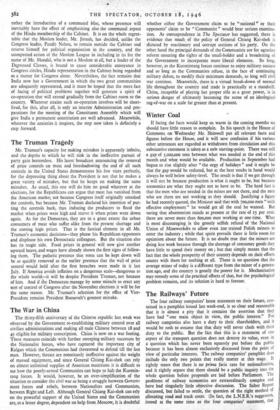The Railways' Future
The four railway companies' latest statement on their future, con- tained in a pamphlet issued last week-end, is so clear and reasonable that it is almost a pity that it contains the assertion that they have had "one main object in view, the public interest." For railway companies also have a duty to their shareholders, and it would be rash to assume that that duty will never clash with their duty to the public. But the ta-ct that this is a statement of one aspect of the transport question does not destroy its value, even in a question which has never been squarely put before the public because it has been almost exclusively discussed from the point of view of particular interests. The railway companies' pamphlet does include the only two points that really matter at this stage. It rightly states that there is no prima facie case for nationalisation, and it rightly argues that there should be a public inquiry into the whole question before proposals are laid before Parliament. The problems of railway economics are extraordinarily complex and have had singularly little objective discussion. The Salter Report discussed, but failed to settle, the question of the right method of allocating road and track costs. (In fact, the L.N.E.R.'s suggestion, issued at the same time as the four companies' statement, that
railway lines should be bought by the State and then leased to the companies, is the most helpful so far.) The principles of rate- fixing are the subject of an enormous and quite inconclusive litera- ture. The experiments made in this country in fixing a proper financial return to the companies have been messy in principle and have not worked in practice. Clearly, the whole question needs an impartial and expert inquiry, and so far the railway companies have shown more willingness to submit themselves to it than those members of the Government who, for undiscoverable reasons, have set their hearts on nationalisation.































 Previous page
Previous page